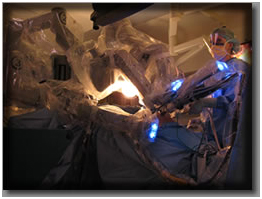Nowadays we try to avoid major surgery for many gynaecological complaints but sometimes it is still the best approach. In 2002 the value study reported on the methods by which hysterectomy is carried out by gynaecologists in the UK. 67% of women had an open procedure involving a large incision in the abdomen, requir-ing a minimum of 3 days in hos-pital, significant pain, and slow recovery to normal activities .

We know that gynaecologists skilled in minimal access surgery (also known as keyhole surgery) using small incisions to pass a telescopic camera and fine
instruments into the abdomen can perform hysterectomy this way for all but the largest wombs.
With the right surgeon and the right equipment less than 5% of cases need to be done through a large incision and women can benefit from less pain, shorter hospital stay (often only over-night) and faster recovery to nor-mal life.
Was this necessary?
However many patients are not made aware of this and might not see a gynaecologist who is trained in carrying out this kind of surgery?. Robotic assisted keyhole surgery gives the surgeon the best view and the most accurate control of the instruments, whilst being able to perform the surgery in the least tiring and physically demanding way for the surgeon.
Robotic surgical systems are now in place at various NHS hospitals around the UK and Ireland and you may be able to benefit from the latest technology if you need a hysterec-tomy or major gynaecological surgery for conditions such as gynaecological cancers, endometriosis, fibroids or prolapse
For more information on whether you may be suitable for robotic surgery and the loca-tions where this is available contact : administrator@biargs.org.uk
BIARGS Leaflet 20 web


